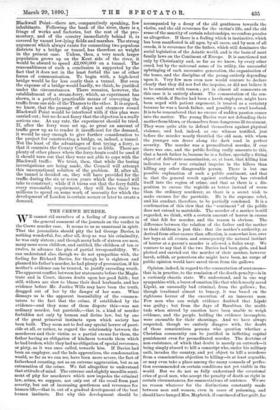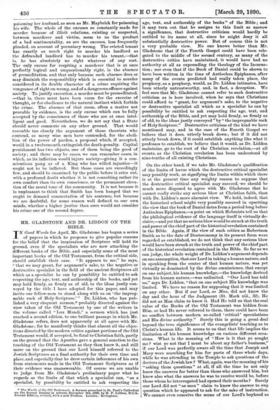THE CREWE MURDER.
WE cannot rid ourselves of a feeling of deep concern at the general comment of the journals on the verdict in the Crewe murder case. It seems to us so unnatural in spirit. That the journalists should pity the lad George Davies, is nothing wonderful, for, after all, deep as was his criminality, he was only sixteen ; and though many lads of sixteen are men, many more seem children, and entitled, like children of ten or twelve, to advance the plea of partial irresponsibility. We can understand also, though we do not sympathise with, the feeling for Richard Davies, for though he is eighteen and planned his father's murder, he had plenty of provocation, if his mother's evidence can be trusted, to justify exceeding wrath. The apparent conflict between her statements before the Magis- trate and in Court, throws doubt upon her good faith ; but still, widows are slow to blame their dead husbands, and her evidence before Mr. Justice Wills may have been the truth, dragged out of her by the danger of her sons. What dismays us is the apparent insensibility of the commen- tators to the fact that the crime, if established by the evidence—and they none of them dispute this—was not ordinary murder, but parricide,—that is, a kind of murder forbidden not only by human and divine law, but by one of the great primeval instincts upon which society has been built. They seem not to feel any special horror of parri- cide at all, or rather, to regard the relationship between the murderers and their victim as a partial excuse for them, the father having an obligation of kindness towards them which he had broken, while they had no obligation of special reverence, or piety, as it was once called, towards him. If Davies had been an employer, and the lads apprentices, the condemnation would, so far as we can see, have been more severe, the fact of fatherhood counting, not as an extreme aggravation, but as an extenuation of the crime. We fail altogether to understand that attitude of mind. The extreme and slightly maudlin senti- ment of pity for murderers which now impedes the criminal law, arises, we suppose, not only out of the recoil from past severity, but out of increasing gentleness and reverence for human life,—that is, out of a gradual development of the best human instincts. But why this development should be accompanied by a decay of the old gentleness towards the victim, and the old reverence for the victim's life, and the old sense of the sanctity of certain relationships, we confess puzzles us altogether. If there is a feeling which is instinctive, which has been manifested in all ages, by all races, and by men of all creeds, it is reverence for the father, which still dominates the social legislation of the Asiatic world, and is the basis of most family laws on the Continent of Europe. It is sanctioned not only by Christianity and, so far as we know, by every other creed, but by the universal sense of its utility, the successful upbringing of each successive generation, the organisation of the home, and the discipline of the young entirely depending upon it. Very few men even now would venture to declare clearly that they did not feel the impulse, or did not believe it to be consistent with reason ; yet in almost all comments on this case it is entirely absent. The commutation of the sen- tence, which, if Davies had been a harsh employer, might have been urged with patient argument, is treated as a certainty because he was a harsh father, and possibly a cruel husband. It is to be remembered that no excuse of sudden passion comes into the matter. The young Davies were not defending their motherfrom blows, or themselves from dangerous ill-treatment. They were quite able to defend themselves against physical violence, and had, indeed, as one witness testified, just before the murder nearly throttled the old man, with whom the younger son drove along the dark road in perfect security. The murder was a premeditated murder, if ever there was one, and the public feeling really amounts to this, that a harsh father is, because he is a father, specially a fitting object of deliberate assassination, or, at least, that killing him indicates less of true criminal impulse in the killers than killing any other disagreeable person. There is but one possible explanation of such a public sentiment, and that is, that the general revolt against authority has extended itself into the region of crime, and that as there is a dis- position to excuse the regicide as better instead of worse than the ordinary murderer, so there is a secret wish to make excuses for the parricide. He is the supreme rebel, and his conduct, therefore, to be partially condoned. It is a confirmation of this view that the " sentiment" of the public does not extend to matricide. The murder of a mother is still regarded, we think, with a certain amount of horror in excess of that felt for murder, and the reason is obvious. The difference between the relation of the father and the mother to their children is just this : that the mother's authority, as derived from other causes than affection, is somewhat less, over her boys at all events, and consequently the natural instinct of horror at a parent's murder is allowed a fuller sway. We venture to say that if the two Davies had been girls, and had plotted and carried out the murder of their mother, however harsh, selfish, or penurious she might have been, no surge of public opinion would have saved them from the gallows.
Opinion, indeed, in regard to the commutation of sentences— that is, in practice, to the remission of the death-penalty—is in a curiously chaotic state. We understand, and in one way sympathise with, a burst of emotion like that which nearly saved Lipski, an unusually bad criminal, from the gallows ; for, though irrational almost to lunacy, it was based on the righteous horror of the execution of an innocent man. Few men who can weigh evidence doubted that Lipski was guilty ; but from the days of Barabbas, the multi- tude when stirred by emotion have been unable to weigh evidence, and the people, holding the evidence incomplete, were excusable for their shoutings. And we have always respected, though we entirely disagree with, the doubt of those conscientious persons who question whether a Christian community can be justified in inflicting capital punishment even for premeditated murder. The doctrine of non-resistance, of which that doubt is merely an outwork—it being simply absurd to kill a conscript who, under his military oath, invades the country, and yet object to kill a murderer from a conscientious objection to killing—is at least arguable, or may even take a place among the many counsels of perfec- tion recommended on certain conditions not yet visible in the world. But we do not so fully understand the occasional cries of good men, who accept the penalty of death as right in certain circumstances, for commutations of sentence. We see no reason whatever for the distinctions constantly made between men and women, even in cases of poisoning, and should have hanged Mrs. Maybrick, if convinced of her guilt, for poisoning her husband, as soon as Mr. Maybrick for poisoning his wife. The whole of the excuses so constantly made for murder because of illicit relations, existing or suspected, between murderer and victim, seem to us the product of a bad sentimentality, as are the excuses, less frequently pleaded, on account of pecuniary wrong. The evicted tenant has exactly as much right to murder his landlord as the defrauded landlord has to murder his tenant,—that is, he has absolutely no right whatever of any sort. The only excuse for respiting a murderer that is at once perfectly logical and unquestionably right, is the absence of premeditation, and that only because such absence does or may diminish the responsibility which is essential to murder considered in its double character of a crime requiring the vengeance of right on wrong, and of a dangerous offence against society. To justify execution, a murder must be premeditated, —that is, there must have been room for the exercise of thought, or for obedience to the natural instinct which forbids the crime. The absence of that room, often a matter not provable by evidence, is the only excuse which can be fully accepted by the consciences of those who are at once intel- ligent and good. Nevertheless, we do not say that a State should never commute on any other ground. That would resemble too closely the argument of those theorists who contend, as many wise men have contended, for the aboli- tion of the power of pardon, a proposal which, if accepted, would in a twelvemonth extinguish the death-penalty. Capital punishment has two objects, one of them being the good of society; and there may be cases, we can remember cases, in which, as its infliction would injure society—giving it a con- scientious pang as of a King who has willed injustice—it ought not to be inflicted. But those cases are exceedingly few, and should be examined by the public before it cries out, with a profound doubt whether it is not consulting rather its own comfort than its own conscience, or the permanent eleva- tion of the moral tone of the community. It is not because it is unpleasant to think that Smith has been hanged that we ought to demand commutation of his sentence, but because we are doubtful, for some reason well defined to our own minds, whether a higher justice than ours would not consider his crime one of the second degree.







































 Previous page
Previous page